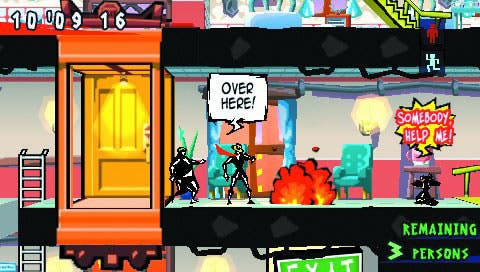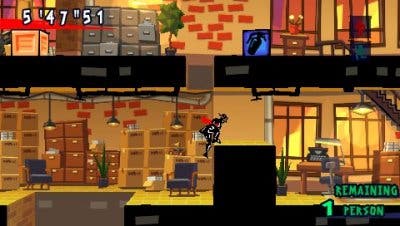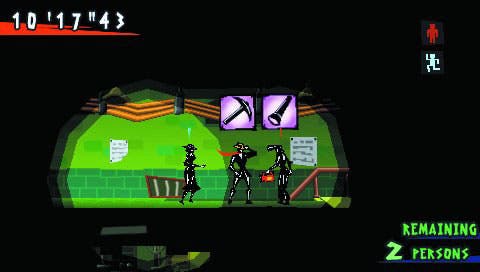Exit
This way to puzzle heaven?
It's nice to find an original game that's designed so intuitively. Exit subtly reminds you of so many games you might wistfully recall playing into the wee hours; it's as comfortable as slipping on your battered old jeans. Taito's puzzle/platformer centres on the character of Mr. ESC: in fact 'character' is certainly the only word to use. The aptly named Mr. ESC is a professional escapologist and a mercenary rescue worker (someday that'll be my job description). There's no more development needed, really.
To The Rescue
The aim throughout is to use Mr. ESC's unique skills to save disaster victims from almost-certain, side-scrolling doom. The game is divided into ten levels, each with ten individual stages, which means (for the mathematically challenged) 100 levels to contort a human brain through - with another 100 for download if you can take it (though how long before we see them here is the question).
While ESC himself is perfectly mobile, agile and capable, controlling the man himself is a doddle and as easy as the words "use the d-pad" suggest. There's also the often fatal, but oh so necessary run button, but the only advice there is to avoid developing a taste for running early on; you'll only hurt yourself later. Thanks to the marvel that is the analogue nub turned mouse, ESC can take a gander around the stage; it's obvious enough but we'd be lost without it.
Exit really stresses the grey matter when we start to interact with his charges. The 'companions' to be rescued have not only got different abilities to our dashing hero, but they also come complete with inabilities that throw hurdles at our loveable protagonist. This often leads to situations where getting to someone proves easy enough, but rescuing them is a mental task of ungodly proportions and the terrifying prospect of "Use a combination of other lads' skills to get out" puzzles.

The talented Mr. ESC can direct his companions, which means that their individual qualities come into play. Children can fit through small spaces, adults can shift boxes around and the infirm can be carried around and generally obstruct every well-laid plan we've ever had. The companions are also directed via the analogue, which functions better here than in most other PSP titles.
Exit is a game of trial and error, though; in fact it's best seen as an extension of the style of play that made Mercury so engaging. We're not playing with simple things like physics here, but learning what ESC and his cohorts are capable of and how to manage everyone at once. Exit evokes the same sense of frustration and elation as Mercury's cycle of repeated failure and eventual success, but in a more engaging way.
It's important to note that Exit never sticks to the point. There's no vast heap of unlockable artwork or bonus levels; the only reason to progress is for progression's sake. It's the old model for games; play it because playing it's entertaining, not because you'll be given a treat at the end. There's also no support for any kind of multiplayer, with wireless reserved exclusively for downloadable content, which nimbly avoids the fact that multiplayer Exit is a rubbish idea.
Let's get Shallow

Mr. ESC is probably the single most beautifully minimalist character to have graced the PSP's screen yet - no more than a pitch black silhouette of a man with highlights picked out in white and an obligatory splash of colour provided by a constantly windswept scarlet scarf. If Mr. ESC's style had a corresponding substance it would be oil. Oil with a splash of blood, wearing a yellow fedora. Slick.
The background artwork is striking and while it's easy to be reminded of Viewtiful Joe the comparison never feels fair. Thanks to a rough and ready, hand-drawn look, the bold colours and comic style work exceptionally well together, and, on top of that, the items and characters are a stark monochrome so that it's never too hard to find what you're looking for. Similarly, each of ESC's companions sees a similar visual treatment, but as highly stylised as they are, none quite evokes the same degree of fun as ESC.
Every character is superbly animated, though this in itself has been the source of more complaints than anything else. You might argue that the animations themselves take too long, and while we'd enjoy the option to change direction on ladders and interrupt movements, it's important to remember that this is a puzzle game. Those of you who like to barrel around madly will notice quite quickly that ESC doesn't respond as soon as you'd like, and feels similar to trying to pull off running jumps and swift changes of direction in the original Prince of Persia - but with a pressing time limit.
Accident and Emergency
With all that said, Exit does occasionally treat itself to a little platform action, but it never feels as reliable as it could. In fact it's hugely annoying to have a puzzle fully worked out and still be forced to throw attempts away as you're crippled by missed jumps.

Thanks to the length of some animations, and the stubborn ability of your companions to misunderstand directions, there are situations that are thwarted by nothing more than rotten luck and cutting it too close to the timer. While running is a practical necessity in some stages, it has to be said that ESC's braking leaves a little to be desired. In all likelihood, you will fall to your death more times than you'll care to remember.
It's also important to keep in mind that you'll increasingly come across situations where the margin of error is infinitesimal; move this box a shade too far and there's no going back; please restart the stage. Only you'll never be told you're beyond reprieve. Instead you labour pointlessly on until you realise the mistake ten steps later.
Shepherding the hapless victims around might well be a chore to control at times, but coupled with the audio it becomes a surreal aural nightmare. The soundtrack is jazzy and helps keep the mood while the victims moan about their various afflictions. But while the companion's voices are a pleasant touch at first, as soon as you start to weigh in some serious Exit time you'll notice the same stock phrases repeated endlessly, until the only reason to rescue anyone anymore is so they'll stop bloody talking. We understand you're hungry sweetheart, but if you keep telling us you're not leaving this damned hellhole anytime soon.
The Great Escape
Fortunately for Mr. ESC, Exit more than redeems itself in the face of its various niggling inadequacies. While the companions may prove annoying at times, it's easy enough to resign yourself to their whining and manage the task in hand; for every platform blunder there are ten moments of huge satisfaction to look back on. Anyone arranging hapless innocents on balancing platforms, dodging electrocution and being forced to prioritise limited fire extinguishers will be intimately familiar with the sweet sigh of success. Those moments where you just squeak through are worth the asking price alone, and at times Exit really does feel top notch.
